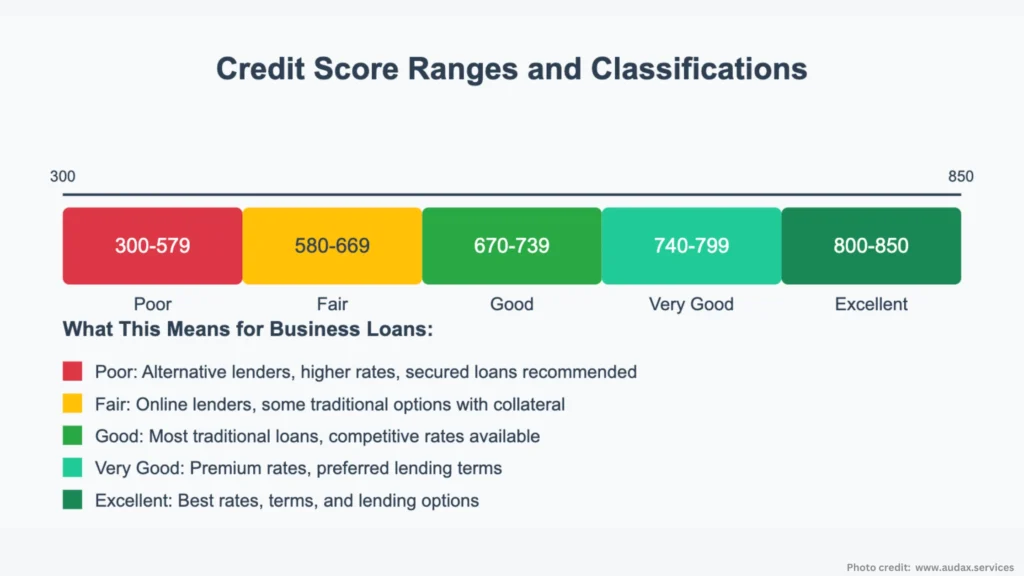
For many American business owners, maintaining perfect credit isn’t always possible. Whether you’re dealing with past financial challenges or just starting your entrepreneurial journey, a less-than-stellar credit score shouldn’t mean the end of your business dreams. This comprehensive guide will walk you through all your options for securing a business loan with bad credit, helping you understand where to look, what to expect, and how to improve your chances of approval.
Understanding Bad Credit Business Loans
Bad credit business loans are specifically designed for entrepreneurs whose credit scores fall below traditional lending requirements. While traditional banks typically require scores of 680 or higher, many alternative lenders work with businesses whose owners have scores as low as 500. These loans often come with higher interest rates and fees but can provide crucial funding when traditional options aren’t available.
What Qualifies as Bad Credit?
- Poor: 300-579
- Fair: 580-669
- Good: 670-739
- Very Good: 740-799
- Excellent: 800-850
Top Sources for Bad Credit Business Loans

1. Online Lenders
Online lenders have revolutionized the lending landscape for credit-challenged businesses. These alternative lenders use technology and innovative assessment methods to evaluate loan applications, often looking beyond just credit scores.
Advantages:
- Quick application process
- Fast funding (often within 24-48 hours)
- Flexible credit requirements (some accept scores as low as 500)
- Simple online interfaces
- Minimal paperwork
Popular Online Lenders:
- Fundible: Accepts scores as low as 450
- Fora Financial: Minimum score of 500
- OnDeck: Minimum score of 625
- Kabbage: Focus on business performance over credit score
2. SBA Loans and Programs
The U.S. Small Business Administration offers several programs specifically designed for businesses that might not qualify for traditional financing.
Key SBA Programs:
- Microloans (up to $50,000)
- Community Advantage Loans (up to $350,000)
- 7(a) Small Loans (up to $350,000)
Benefits of SBA Loans:
- Lower interest rates (typically 8-13% for microloans)
- Longer repayment terms
- No credit score minimum for some programs
- Additional business support and education
3. Community Development Financial Institutions (CDFIs)
CDFIs focus on economic development in underserved communities and often work with credit-challenged borrowers.
Features:
- Competitive interest rates
- Flexible requirements
- Local market understanding
- Additional business support services
- Focus on relationship-based lending
4. Alternative Financing Options
Invoice Factoring
- Advance rates up to 85% of invoice value
- Credit score less important than client creditworthiness
- Quick funding
- No debt incurred
Merchant Cash Advances
- Based on future credit card sales
- Quick approval and funding
- Higher cost but flexible repayment
- No fixed monthly payments
Equipment Financing
- Equipment serves as collateral
- More lenient credit requirements
- Fixed interest rates
- Predictable payment schedule
How to Improve Your Chances of Approval
1. Prepare a Strong Business Plan
- Detailed financial projections
- Clear use of funds
- Marketing strategy
- Competition analysis
- Management team information
2. Gather Required Documentation
- Business and personal tax returns
- Bank statements (last 6-12 months)
- Profit and loss statements
- Balance sheets
- Business licenses and registrations
- Collateral documentation (if applicable)
3. Improve Your Application Profile
- Maintain steady revenue for at least 3-6 months
- Keep business and personal finances separate
- Build relationships with potential lenders
- Consider a co-signer
- Offer collateral when possible
Understanding the Costs
Typical Cost Ranges:
- Traditional Bank Loans: 5-13% APR
- Online Lenders: 8-99% APR
- SBA Microloans: 8-13% APR
- Merchant Cash Advances: Factor rates 1.1-1.5
- Equipment Financing: 8-30% APR
Additional Fees to Consider:
- Origination fees (1-5%)
- Processing fees
- Prepayment penalties
- Late payment fees
- Annual fees
Building Credit for Better Future Options

Short-term Strategies:
- Make all payments on time
- Keep credit utilization low
- Monitor credit reports regularly
- Dispute any errors
- Maintain separate business credit
Long-term Strategies:
- Establish trade credit with suppliers
- Use a secured business credit card
- Build banking relationships
- Keep detailed financial records
- Reinvest profits into the business
Common Mistakes to Avoid
- Taking the first offer without shopping around
- Not reading the fine print
- Borrowing more than necessary
- Ignoring the total cost of borrowing
- Not having a clear repayment plan
- Mixing personal and business finances
Conclusion
While having bad credit can make securing business financing more challenging, numerous options exist for American entrepreneurs. The key is to understand your options, prepare thoroughly, and choose the financing solution that best fits your business needs and repayment ability. Remember that many successful businesses started with less-than-perfect credit, and with proper financial management, you can build both your business and your credit profile over time.
Frequently Asked Questions
What is the minimum credit score needed for a business loan?
While traditional banks typically require scores of 680+, alternative lenders may accept scores as low as 500. Some SBA microloans and community lenders have no minimum credit score requirement.
Can I get a business loan with no credit check?
Yes, certain financing options like merchant cash advances and some invoice factoring agreements don’t require credit checks. However, these options typically come with higher costs.
How long does it take to get approved for a bad credit business loan?
Approval times vary by lender:
- Online lenders: 24-72 hours
- Traditional banks: 2-4 weeks
- SBA loans: 30-90 days
- CDFIs: 2-6 weeks
What documents do I need to apply for a bad credit business loan?
Common requirements include:
- Business and personal tax returns
- Bank statements
- Financial statements
- Business plan
- Business licenses
- Collateral documentation (if applicable)
Can I get a business loan with a bankruptcy on my record?
Yes, but options are limited. Most lenders require 2-7 years post-discharge, depending on the type of bankruptcy. Alternative financing options like invoice factoring may be available sooner.
In another related article, Can You Get a Business Credit Card Without a Business?




